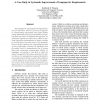Free Online Productivity Tools
i2Speak
i2Symbol
i2OCR
iTex2Img
iWeb2Print
iWeb2Shot
i2Type
iPdf2Split
iPdf2Merge
i2Bopomofo
i2Arabic
i2Style
i2Image
i2PDF
iLatex2Rtf
Sci2ools
116
click to vote
RE
2006
Springer
2006
Springer
A Case Study in Systematic Improvement of Language for Requirements
The challenges to requirements from linguistic factors are well-known. This work concerns an approach to communicating requirements with greater fidelity among stakeholders through accommodation of cognitive habits and limits. To instantiate this approach, we synthesized linguistic principles into a method to generate high-quality representations of domain concepts to form the base of a project lexicon. The representations are further organized into a knowledge base that records relationships of interest. We hypothesize that the method leads to representations free of certain faults that compromise communicative fidelity. To investigate, we executed a case study in which the method was applied to the domain semantics of a medical device. Our representations compared favorably to pre-existing versions; further, analysis of the artifact as a whole supported new assertions about the application domain. These results indicate that particular language issues can be systematically managed, ...
Related Content
| Added | 15 Dec 2010 |
| Updated | 15 Dec 2010 |
| Type | Journal |
| Year | 2006 |
| Where | RE |
| Authors | Kimberly S. Wasson |
Comments (0)

